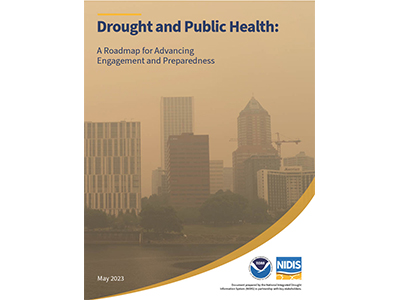Environmental and human health in agricultural systems
The institute works to ensure that efforts to improve water and food security also advance public health and protect ecosystem integrity, drawing on the university’s leadership in regenerative agriculture, natural resources management, water stewardship, water quality analysis, drought mitigation, nutrition and public health. We collaborate with internal and external partners to increase our knowledge regarding the challenge of water quality degradation in Nebraska and elsewhere in the world.
Contribution to the Fifth National Climate Assessment
The Fifth National Climate Assessment is federally mandated by Congress and released every four years to serve as the foremost review of research on the current and future impacts of climate change in the United States. DWFI Director of Water, Climate and Health Jesse Bell, who leads the Water, Climate and Health Program at the University of Nebraska Medical Center, co-authored the chapter on climate change and human health. Additionally, DWFI Faculty Fellows Andrea Basche and Tonya Haigh co-authored the Northern Great Plains chapter, which includes Nebraska.
The first comprehensive assessment of drought and health in the US

Jesse Bell, DWFI Director of Water, Climate and Health; and Rachel Lookadoo, DWFI Faculty Fellow and Director of Legal and Public Health Preparedness for Center for Preparedness and Emergency Response Solutions, were co-authors on the nation’s first comprehensive assessment of drought and health, titled “Drought and Public Health: A Roadmap for Advancing Engagement and Preparedness” The result of several years of outreach efforts throughout the United States from 2019-2022, the document highlights engagement and preparedness needs as voiced by drought stakeholders across the nation. This document led to the creation of the new “Drought and Health: A Messaging Framework for Public Health professionals and Healthcare Providers” messaging tool.
Advancing health through climate action in the US
Published annually, the Lancet Countdown on Health and Climate Change Policy Brief for the United States of America is an international, multidisciplinary collaboration, dedicated to monitoring the health profile of climate change. The brief presents country-level US data on the health impacts of climate change from the 2023 Global Report of the Lancet Countdown, which tracks the relationship between health and climate change across five key domains and 47 indicators. Building on this evidence, the U.S. Brief recommends opportunities for advancing health through climate action. DWFI Faculty Fellow Rachel Lookadoo, JD served as a reviewer for the brief.
Managing and mitigating nitrate in Nebraska water systems

Nitrate is a naturally occurring compound found in soil and water. However, consumption of high concentrations of nitrates has been linked to various adverse health outcomes. Certain human activities can contribute to concentrations of nitrate beyond the level considered safe. Unlike community water systems, private wells owned by individual households (of which about 20% of the state rely on for drinking water) do not require contaminant testing or treatment and are most at risk.
A study by Harshanee Jayasekera, DWFI postdoctoral research associate, focused on drinking water systems in Nebraska and their trends in nitrate contamination levels. Statewide, the analysis shows that nitrate levels have been increasing over the years, however, the average disguises the highest and lowest contamination levels. Gaining a better understanding of nitrate contamination trends over time can show which areas or water systems will be approaching the maximum allowable nitrate level for drinking water faster than others and aid in targeting mitigation efforts by water managers and policy makers.
Another article by Jayasekera shares that testing drinking water from private wells is essential to gain a realistic understanding of nitrate contamination and determine if treatment may be necessary.
The team at DWFI also worked to identify opportunities to limit nitrate consumption and associated barriers for individuals dependent on drinking water through private wells and participated in several outreach opportunities related to private well water safety, including a community forum on Nebraska water.
Legacy Nitrogen, Arsenic, and Uranium in the Vadose Zone
A new study from a Nebraska Water Center research team discusses the relationship between legacy nitrogen and inputs on arsenic and uranium in the vadose zone, the part of Earth between the surface soil and the groundwater table. Titled “Interplay of legacy irrigation and nitrogen fertilizer inputs to spatial variability of arsenic and uranium within the deep vadose zone,” this article was published in Science of Total Environment and continues the work the research team has been conducting on water quality.
Nebraska Water Center researchers improving USDA crop models
Under a federal cooperative agreement, two Nebraska Water Center researchers are assisting the USDA Agricultural Research Service to improve crop models for corn, soybean, cotton, rice, and potato. As crop models are improved, producers can find more accurate data to aid their on-farm decision making. The team has been updating widely used crop simulation models to simulate photosynthesis, transpiration, and soil processes at more frequent time steps. The updates described in the new publications also allow for adaptation of the model based on climate change factors, including atmospheric CO2 and changes in average temperature.
Related articles
- Nitrate management in Nebraska community water systems is a complex issue (September 1, 2023)
- Reducing nitrate intake and health complications from drinking private well water (November 16, 2023)
- Nitrate trends in domestic wells in Nebraska (February 21, 2024)
Top image caption
The sun shines over rocks along a flowing river.
Credit: Bafan4u | Storyblocks
COOKIE USAGE:
The University of Nebraska System uses cookies to give you the best online experience. By clicking "I Agree" and/or continuing to use this website without adjusting your browser settings, you accept the use of cookies.

